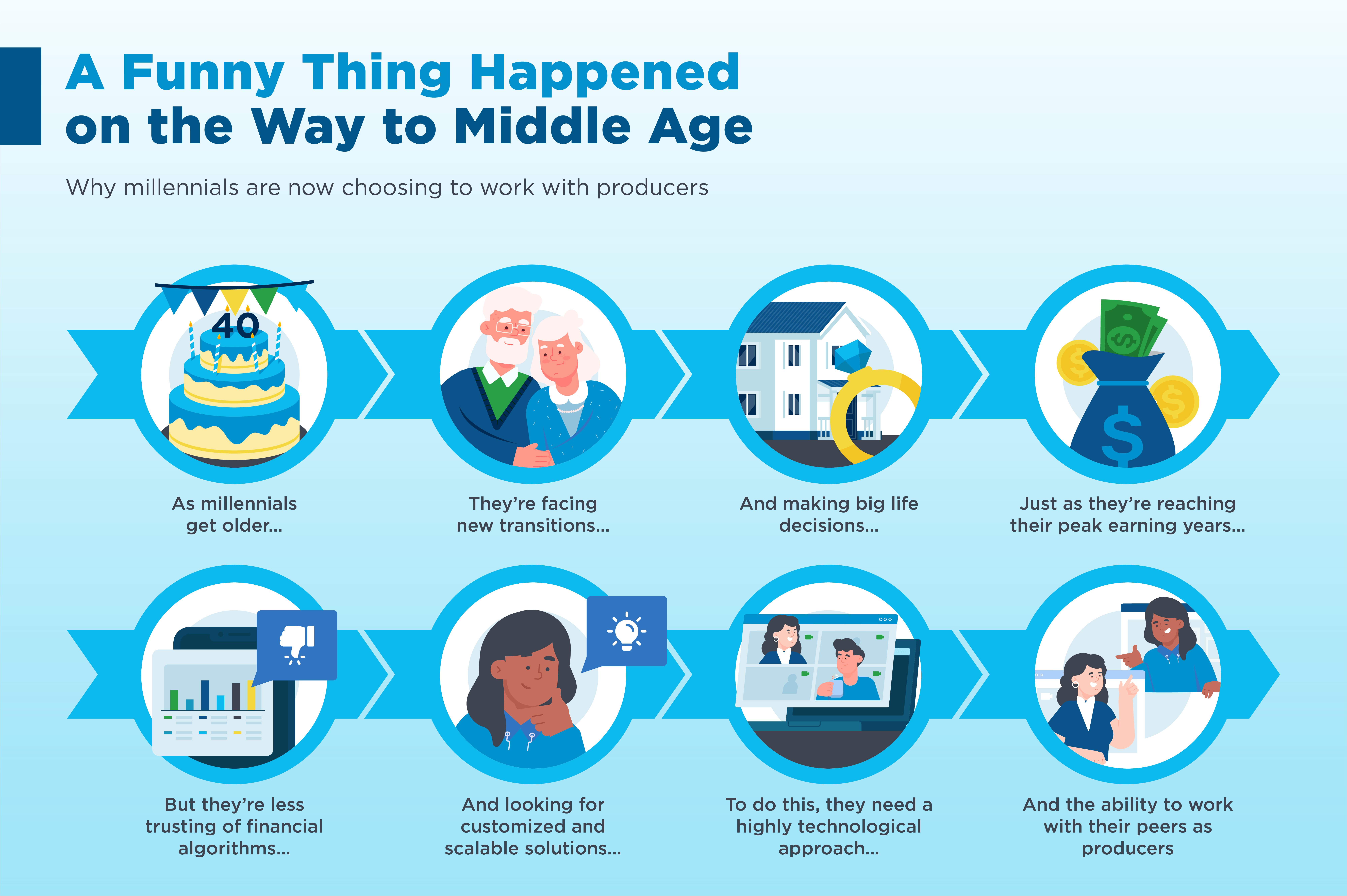Why they may be warming up to financial planning
Not long ago, financial professionals looking to work with millennials were finding resistance at almost every turn. Though the more than 75 million Americans born between 1981 and 1996 represent over one-fifth the U.S. population and over one-third of its workforce, less than 25% of all U.S. millennials were, as of November 2021, working with financial professionals.
The reasons were varied. Not enough money to invest. Not enough trust in the financial industry. Not enough millennial representation among producers. And easy enough access to financial services on their own through websites, apps, and social media.
"Millennials more than doubled their total net worth in just two years, reaching $9.38 trillion in the first quarter of 2022"
But a funny thing happened on the way to middle age. Suddenly millennials, the oldest of whom turn 42 this year, are moving into their peak earning years and, at the same time, are thinking about buying homes, starting families, and establishing long-term financial goals—even adding retirement accounts into the mix. A harbinger of this evolution is the fact that millennials now represent 43% of homebuyers, the highest share of any generation, according to the National Association of Realtors. And they can afford these houses: A MagnifyMoney analysis of Federal Reserve data shows that millennials more than doubled their total net worth in just two years, reaching $9.38 trillion in the first quarter of 2022, up from $4.55 trillion in 2020.
Underscoring this evolution, a recent Natixis IM study of 275 millennials in North America with investable assets of at least $100,000 reported that nearly three-quarters of those respondents were using financial professionals—finding producers increasingly more trustworthy than the algorithms many of these millennials had turned to in the past.
Learning to navigate a changing landscape
As more millennials advance in their lives and careers, they may be beginning to realize there may be important decisions to make that they may not be equipped to handle on their own. They are inheriting money or being forced to make decisions on behalf of their aging parents. They may be struggling to make sense of a constantly fluctuating market. The answer, increasingly, is professional advice.
Take 27-year-old Isabel Barrie. Three years ago, after her father died, she received a sizable inheritance. Her father, who lived with Parkinson’s disease for more than a decade, died from Covid-19 in May 2020. Six months later and with the pandemic still raging, she says, "I was struggling to settle the estate. Seeing the stress I was under, my mom connected me to her financial planner. Once the estate was settled, I transferred my inheritance to him, and he began investing it in IRAs, stocks, ETFs, and mutual funds."
For millennials like Barrie, working with a financial professional may provide a personalized path through which to navigate an ever-changing financial landscape, particularly when the stress they’re under makes it difficult to research and make important financial decisions on their own.
“I find my financial professional’s advice insightful,” Barrie says. “He has been very patient with me and explained everything in great detail, taking lots of time to answer all of my questions. He is candid with me about the projected direction of the markets, sometimes sharing difficult news.”
Catering to a generation’s specific needs
Certified financial planner Kyle J. Kyper of Pennsylvania-based DSF Wealth Management Group, a millennial himself, believes that his generation values life experiences and having time to do what they want more than previous generations did, and he suggests that they are finding that working with a good financial planner may help with both. .
“Millennials may be willing to pay more for items that provide value and convenience,” he says. “Using technology to help them organize their financial lives is essential and being able to communicate with them through virtual meetings is also crucial. They also may not have the same retirement goals that their parents had, so finding out what is important to them and helping them work toward their definition of financial success is much more effective.”
Catering to millennials presents a unique market for financial professionals, one in which the ability to deliver relevant content and information to clients in an efficient, highly technological, and easy-to-access manner may be crucial. As Kyper notes, video updates and virtual meetings may be the norm, not the exception. The key to success for planners in their efforts to work with millennials may be their ability to provide value in their education, communication, and efficiencies that allow millennials to then maximize their time and resources on items they care most about.
Millennials working with millennials
Following—and even pioneering—the technologically sophisticated approach to financial planning that Kyper describes, is Sophia Bera Daigle, who launched her own millennial-focused financial planning firm, Gen Y Planning, at the age of 29. Nearly 10 years later, Daigle has become something of a model for how to provide financial planning for millennials, sought after for quotes by such publications as The New York Times, Forbes, Business Insider, The Wall Street Journal, and Money magazine. Daigle’s practice of meeting virtually with all her clients using a completely virtual team speaks to her generation’s technological needs and expectations.
However, Kyper points out, there may not be many young financial planners currently positioned to provide the type of service and advice to millennials that he and Daigle offer. One answer, he suggests, is finding and grooming financial professionals “who are younger and who may provide advice and build relationships with other millennials that may continue as they accumulate wealth and face more complicated planning situations. Younger financial professionals who are also millennials understand the mindset of millennials more easily and have an easier time communicating and connecting with them in the ways they may accustomed to."
Moreover, he adds, “there is also an advantage to having younger financial professionals on your team from a continuity and succession standpoint. A millennial may not be interested in building a relationship with a financial professional who is 55 or 60 years old and is likely to retire in the midst of important life transitions and career decisions.”
Kyper also suggests that financial planners working with millennials need to reconsider the ways in which they market products to them. Millennials, he says, were historically either sold some sort of product or firms were not geared to market toward a younger demographic in part because of the large monthly retainer. There are now, he adds, a lot of fee-based subscription models that may be helping provide options for millennials moving forward, but he says there may not be yet enough.
Time to face uncomfortable questions
For 28-year-old Oscar Rieveling, having a professional to consult for his finances provides the motivation to plan ahead for the future and help him think about the tangible and even scalable steps he needs to take to achieve the big things that are important to him. This was in large part the deciding factor in his decision to work with a financial planner.
“I think my planner is attuned to understand where I'm at financially and recommend a plan that could support where I want to be in the future,” he says. “It was useful to understand that investing may be scaled to where you happen to be. It felt like the conversation allowed me to zoom out on a timeline that I typically experience up too close, quite often just day to day. I'm getting to a point in life where I can't shy away from long-term planning like I generally have, so I took this as a chance to face uncomfortable questions like how many children I want to have and at what age I want to retire. Overall, the planner was patient in outlining all the steps and walking me through the different options to consider.”
Millennials like Isabel and Oscar are just some of many examples of millennials beginning to take the leap to plan for their financial futures. With the help of financial planners, they may be able to confront the uncomfortable challenges that come with the unknown and tackle the factors they do have control over in the present.
Share
Related resources
More on Practice Management
Your Thriving
Practice
A destination to empower financial professionals to build, manage, and grow their practice
Get started with Global Atlantic
Take the next step with a company that can help elevate your business.
Need help?
Find all the contact information to submit and service your business.











